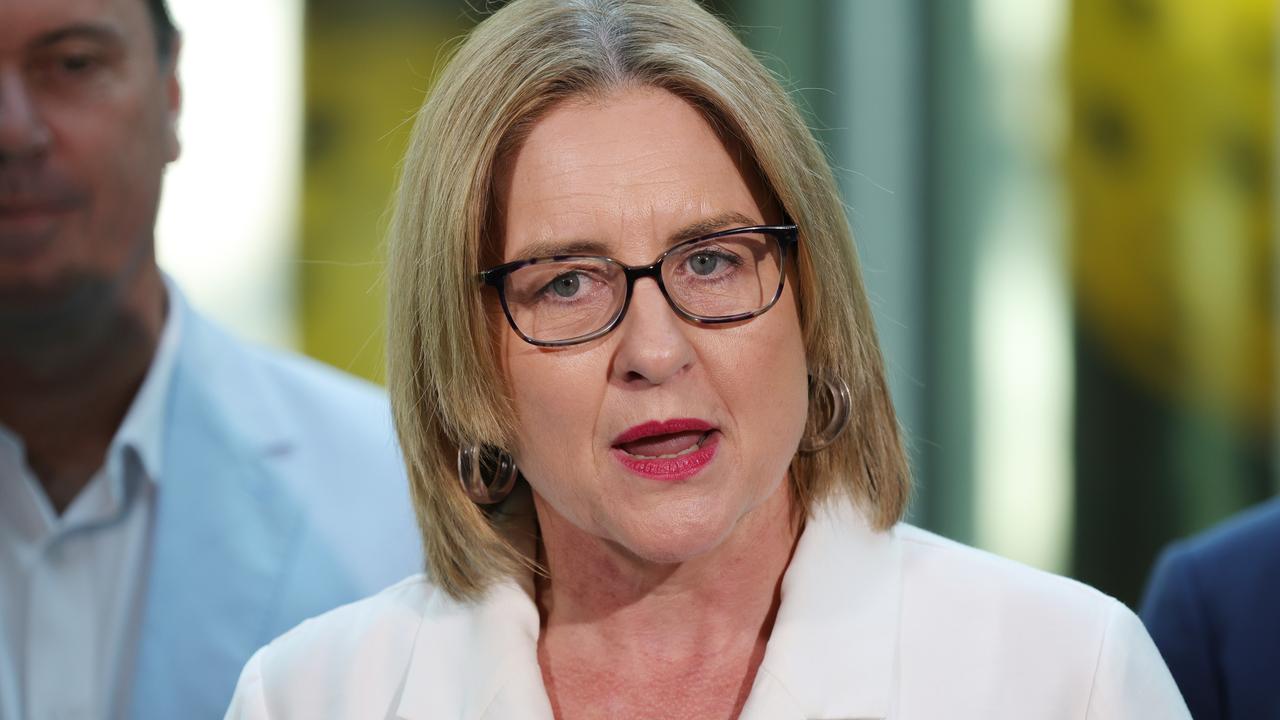Breast Cancer Network Australia marks 25 years of supporting patients
Cancer survivor Lyn Swinburne had to fight for permission to march 10,000 people on to the ‘G for the first Field of Women. This month, the iconic event will be staged for the fifth time.
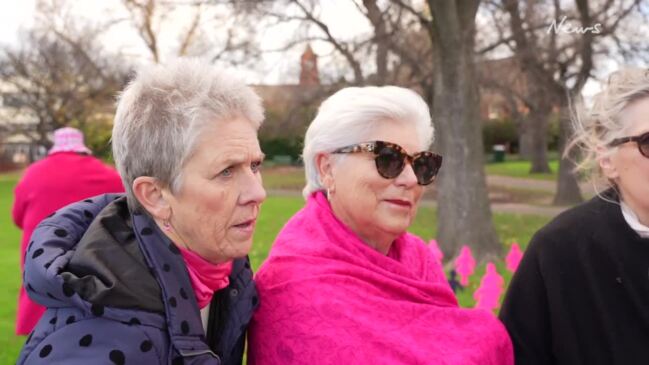
Victoria
Don't miss out on the headlines from Victoria. Followed categories will be added to My News.
When Lyn Swinburne was diagnosed with breast cancer over the phone in 1993, she left the experience feeling like “I was a tumour on legs”.
The disease didn’t have the profile it does today, Swinburne says. Quite the opposite.
She would soon learn from speaking to other women that poor bedside manner was unfortunately the norm.
“When I was first diagnosed, people came out of the woodwork … to say things like, ‘I had a mastectomy 10 years ago and I’ve never told anyone, not even my children,’” she recalls.
“For a lot of women, it was very secretive and a bit shameful, which sounds weird now because it’s talked about so openly.
“I was also quite shocked that it was really hard to get information. I sent my husband, Tom, to the library to get books and he came home with this pathetic pile of stuff that had no relevance to me.
“I was desperate for information, and for power.”
After “struggling” through treatment in the years following her diagnosis as a 40-year-old mother of two young children, Melbourne’s Swinburne, now 71, embarked on a mission to “make things better for women who would follow us”.
Breast Cancer Network Australia (BCNA) – now one of Australia’s most influential breast cancer support, information and advocacy groups – was born.
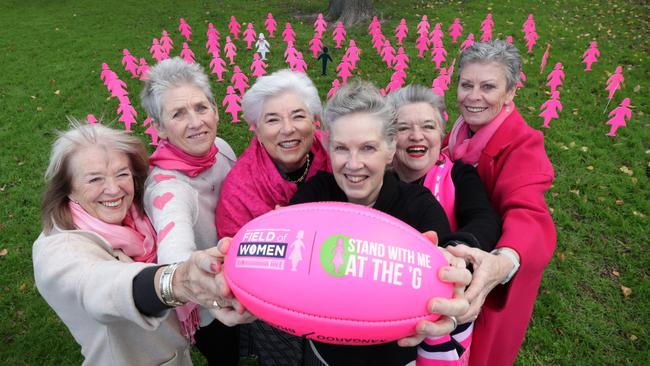
Now in its 25th year, the organisation has grown from humble beginnings at Swinburne’s dining table to reach more than 70 per cent of newly diagnosed Australians.
Its major awareness and fundraising event, Field of Women, has been replicated across Australia and overseas. The most iconic iteration – which sees 10,000-plus people stand in the shape of the Pink Lady silhouette on the MCG to bring breast cancer statistics to life – has opened the floodgates to the AFL embracing other charitable rounds each year.
“One of the things BCNA has done, and it sounds silly, we’ve put the women at the centre of this disease,” Swinburne says.
“We want to make sure they receive care and support, rather than just treating breast cancer like a medical, scientific situation.”
Medical oncologist, former BCNA board member and Sydney University Professor Fran Boyle attributes Swinburne and her network’s success to the fact they listened to breast cancer patients’ experiences and needs, supported them and then “mobilised (them) to help others”.
“They did the hard yards. That has flowed on to benefit lots of other people with cancer,” she says.
“They advocated for multidisciplinary care to be properly organised, for communication skills training (for health professionals), for people to be able to use their super tax-free if they had a terminal illness and needed financial support, for expensive new drugs to be available.
“They changed how health professionals and consumers interact.”
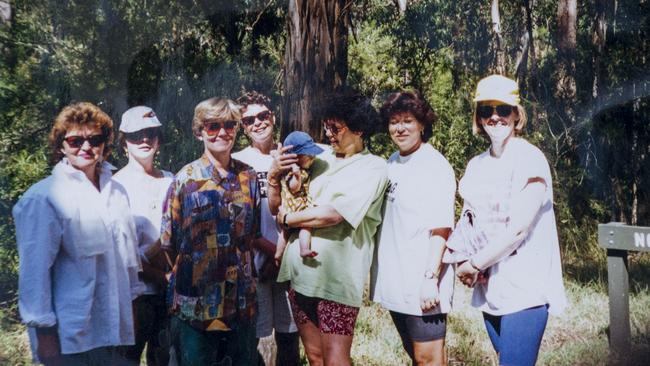
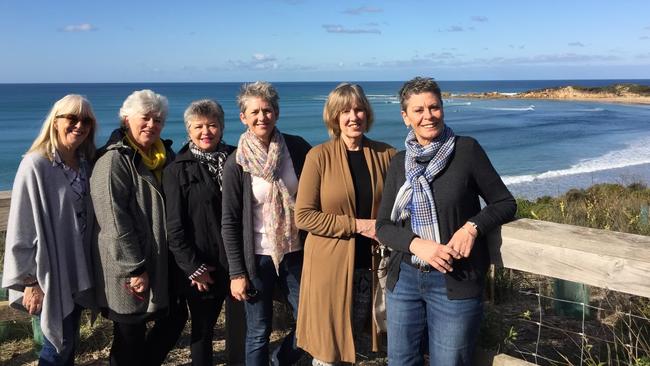
Building BCNA was “a family affair” for Swinburne. Her children, Eliza and James – aged eight and six when she was diagnosed – have worked at BCNA. Her sister-in-law, Maureen, volunteered for more than two decades.
And her oldest friends, a group called “The Boilers”, have dedicated countless hours to their mate and her organisation.
The Boilers’ friendship spans more than half a century and has endured through marriages, kids, careers, two breast cancer diagnoses and the tragic death of one of their own from the disease, Karen Albrecht.
Swinburne met Karen, Marita O’Keefe, Lynne Williams, Carolyn Allison and Ronna Moore at teachers college in Victoria in the 1970s, when they were all 18.
After Karen sadly succumbed to breast cancer 26 years ago, her best friend, Kris Fitzgerald, became “an honorary Boiler”. Fitzgerald cared for Karen while she was undergoing cancer treatment, and then looked after Karen’s children after she died.
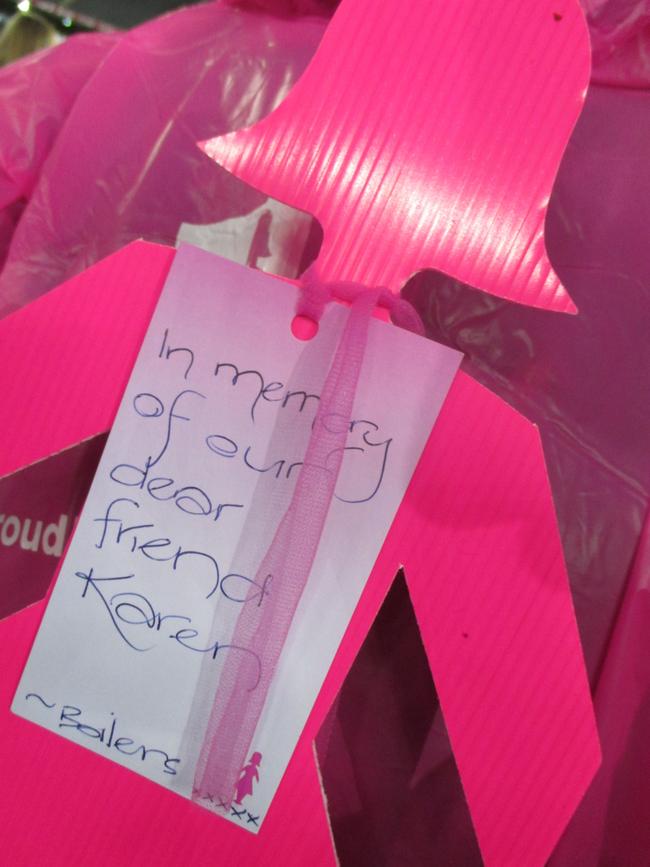
Every year since Karen’s death, the women have had “a Boilers’ weekend” at Fitzgerald’s place on Victoria’s southwest coast, which involves getting their photo taken at a bench they have turned into a memorial to Karen.
“The last time was amazing … because the woman who took the photo said, ‘I have walked past here, and I’ve wondered who Karen is,’” O’Keefe says. “So we were able to tell her story.”
Swinburne’s desire to tell women’s stories is at the heart of BCNA.
Hearing patients from across Australia share their experiences at a meeting in Sydney spurred Swinburne to seek seed funding to start a newsletter called The Beacon in 1997. It still exists today.
“Here are all these women saying how badly they’d been managed or they’d been misdiagnosed, or they lived in the bush and couldn’t get a diagnosis for six months and then their cancer was advanced,” she says. “It was really shocking.”
The first Beacon featured insights from women with breast cancer, such as “how they managed, what they found that helped them, what we needed to do”.
“I would bribe my children and their friends to put them in envelopes, on which I would hand write names (of recipients),” Swinburne says.
“Then, I’d take them down to the Hawthorn Business Centre (in Melbourne to post, and) they used to hate me. They’d go, ‘oh my God, here she comes with the station wagon’.
“You can’t get much more grassroots than that.”
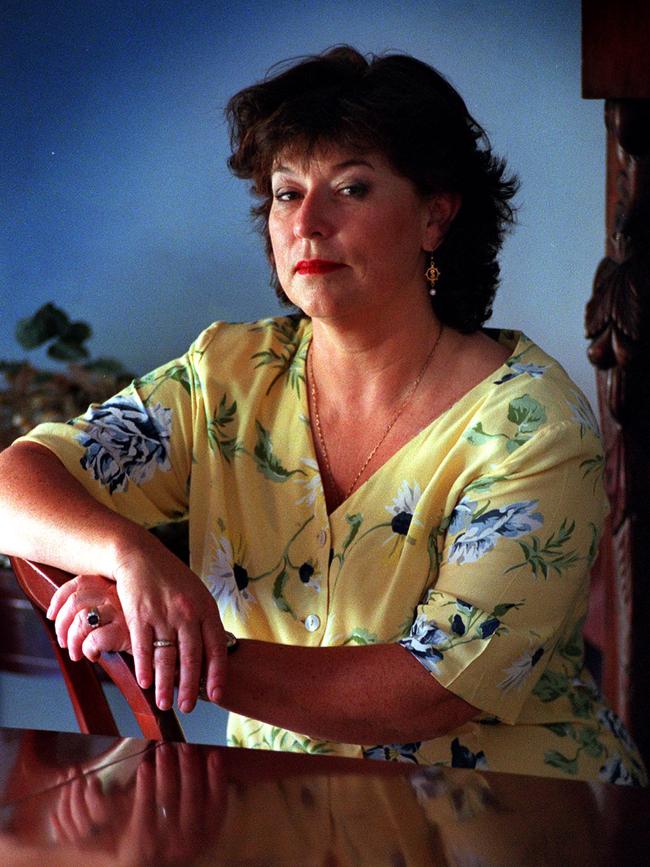
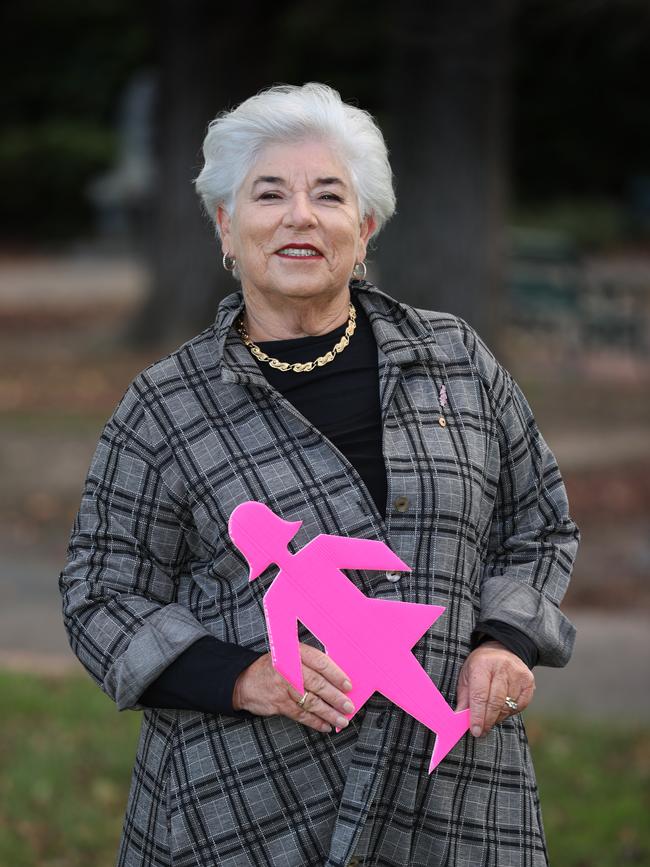
Swinburne then began holding meetings in town halls and joining support groups for patients across Australia. She built up a database of The Beacon subscribers and recruited like-minded women.
This led to the first conference for breast cancer patients in Canberra in 1998, which generated an action plan and officially formed BCNA.
Swinburne says a lot of items on that list have been ticked off, including ensuring all women have access to a breast care nurse – a service now driven by sister organisation, the McGrath Foundation.
Another considerable victory was getting the Australian government to subsidise a targeted treatment called Herceptin by adding it to the Pharmaceutical Benefits Scheme in 2006.
Brisbane breast cancer survivor Sherone Brown says without this, the treatment would have cost her $60,000 per year.
“I honestly believe Herceptin is the reason I’m here today. It was the difference between life and death,” she says.
Receiving a BCNA “My Journey kit” shortly after her first diagnosis in 2005 was empowering and comforting for Brown, then aged 40 and with two young children. The binder – which these days is largely a digital resource – was filled with information about breast cancer and had space for note-taking and journalling.
“It was my bible,” Brown says. “There was very little information on the internet (and) education is empowerment. When you know more about your diagnosis, you have a better understanding of what you’re facing.
“Within the first two weeks (of being diagnosed), BCNA was a part of my life.”
Brown – who says she’s now “really good” following a re-diagnosis in 2018 – has since acted as a BCNA “consumer liaison” and spoken at many events, including the 2014 Field of Women at the MGC. She says that experience “took my breath away”.
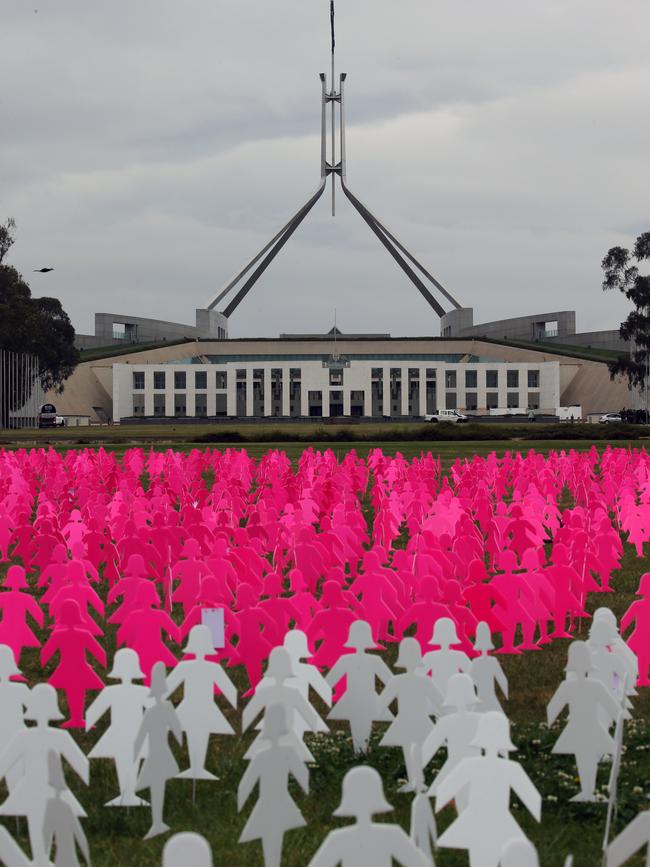
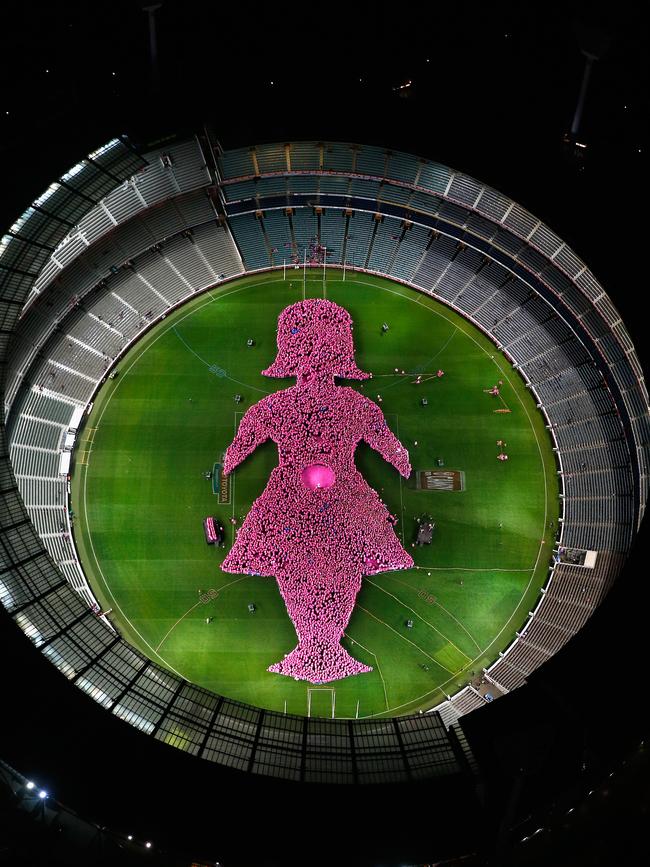
The Field of Women was also born at theCanberra conference.
Attendees caught buses to Parliament House, where they planted 10,000 pink silhouettes for the women who would be diagnosed with breast cancer that year and 2500 white silhouettes for those who would die.
“We wanted people to go, ‘Oh my God, each of those stands for a woman,’” Swinburne says.
The Canberra politicians, and Australia more broadly, did just that. Swinburne and BCNA had put breast cancer on the agenda.
Fields were held annually in six different states in the following years. But by 2005, Swinburne felt the concept had “lost some of that impact”, so she approached the AFL.
Convincing the sporting body to allow her to stage Field of Women on the turf at the nation’s biggest stadium was “really challenging, because no one had done anything before”.
“People were saying things to me like, ‘But what are you actually going to do?’” she recalls.
“They didn’t understand that it’s about being there together, feeling that force and that understanding from one person to another.
“We also wanted to get the message across to men because, for a start, some men do get breast cancer. And when women are diagnosed, they need support from a range of people and often they are husbands or partners or fathers or colleagues.
“It’s not just a women’s issue, it’s an issue for the community.”
The AFL ultimately agreed, and with support from BCNA partners the Melbourne Football Club and Baker’s Delight, thousands of Field of Women participants in ponchos coloured pink, white and also blue (for the men diagnosed) have since stood on the MCG four times.
The fifth iteration will occur on August 20, before the AFL Round 23 Melbourne vs. Hawthorn match, with thousands of people from across the states and territories attending.
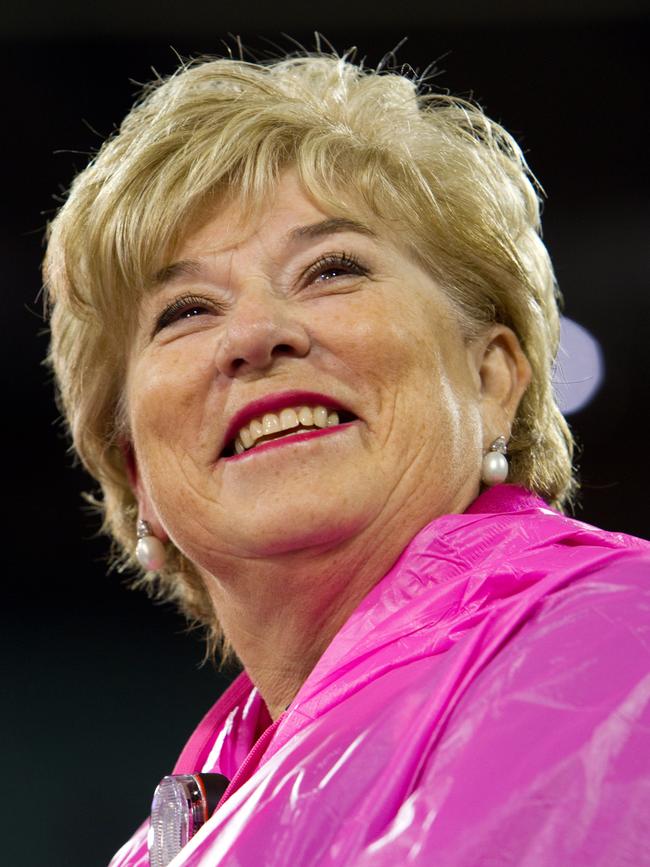
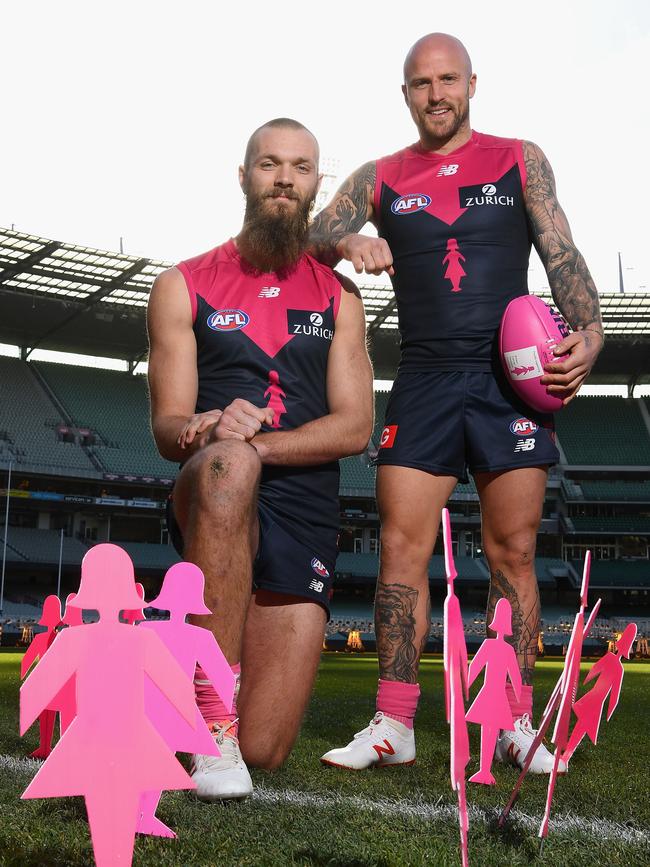
Swinburne retired as BCNA chief executive in 2011. But the grandmother of five’s legacy looms large over the organisation, which she believes is as important as ever.
“This year, more than 20,000 women will be diagnosed with breast cancer,” she says, noting about 3200 of them will die from the disease, along with 40 men.
“That’s a reality check for people who think it has gone away – (since the first Field of Women) that number has doubled.”
She names two goals she’s still fighting for: more psychological support for women who are diagnosed and a register of patients who have recurring cancer or whose cancer advances.
“When you’re first diagnosed, that has to be reported to a cancer registry by law. But when a woman goes on to get metastatic disease – so it turns up in her bones, brain, liver or lungs – that’s not reported,” Swinburne says.
“We’ve been fighting for a long time to get the figures captured … because how can we offer the support that’s needed when we don’t even know how many women are in this state?”
Boyle hopes a roundtable that was held in Canberra this week will help improve data collection on breast cancer recurrence.
And Adelaide clinical psychologist Dr Charlotte Tottman, who specialises in providing treatment for cancer-related distress, agrees that “the psychological experience (of breast cancer) needs just as much attention as the medical experience”.
BCNA has already brought awareness to this, advocated for better services and provided services themselves, says Tottman, who herself had a double-mastectomy following a breast cancer diagnosis in 2018.
This includes developing a peer-to-peer network allowing people to “connect with others who know what it’s like to live with breast cancer” and creating a podcast Tottman co-hosts called Upfront About Breast Cancer – What You Don’t Know Until You Do, which blends her lived experiences and clinical expertise.
But more needs to be done, including getting more professionals into her under-resourced field of psycho-oncology.
“For people with early-stage breast cancer, the psychological experience is usually longer than the medical experience,” she says.
“I’m still adjusting myself, I live with fear of recurrence. Some days are easier than others.”
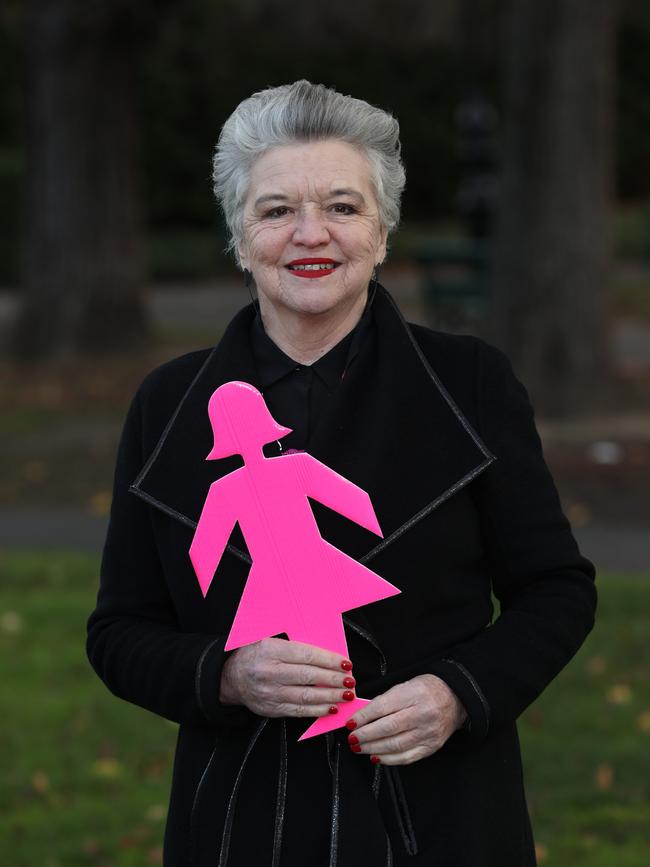
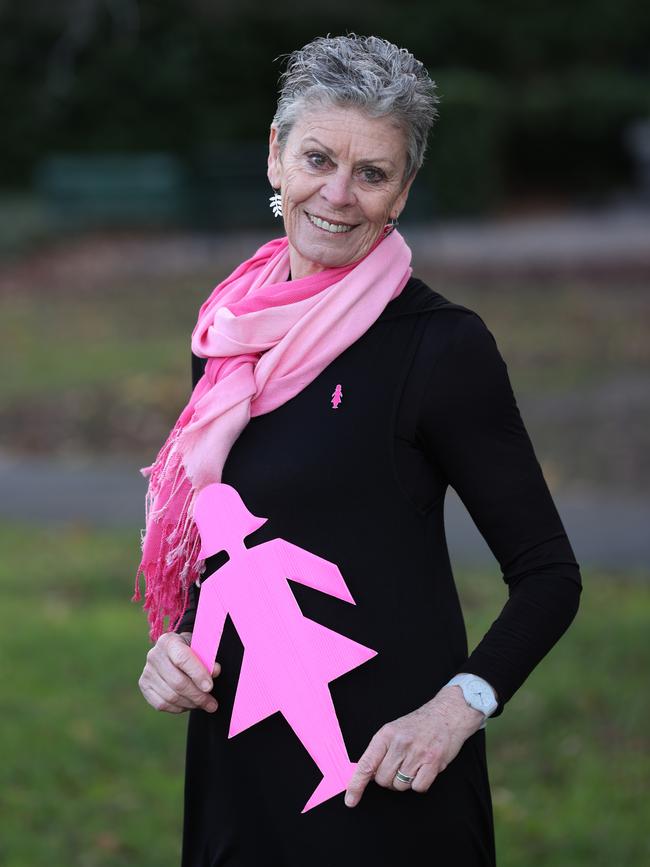
The Boilers have all made vast contributions to BCNA – from planting and removing thousands of Pink Lady silhouettes for Fields of Women, to selling and posting merch, attending fundraisers, doing research and policy work, and more.
O’Keefe, a former art teacher, helped design the now-famous Pink Lady using cardboard and “hot pink paint” Swinburne had asked her to nick from the school she was working at.
When asked why they’ve volunteered so much time to Swinburne and the network, O’Keefe responds: “We believe in it.”
Williams adds: “I guess you start off doing it because someone’s your friend or someone you know is affected by breast cancer. But then it also becomes what you get out of it, this feeling you’re doing something for someone else.”
Allison also chimes in: “There have been times where life (got in the way of our friendship), but we’ve always come back together, kept that connection to BCNA through Lyn.
“I’m very proud to give my time to the organisation and support Australians affected by breast cancer.”
Buy tickets or a virtual place for the Field of Women at fieldofwomen.org.au
Originally published as Breast Cancer Network Australia marks 25 years of supporting patients


